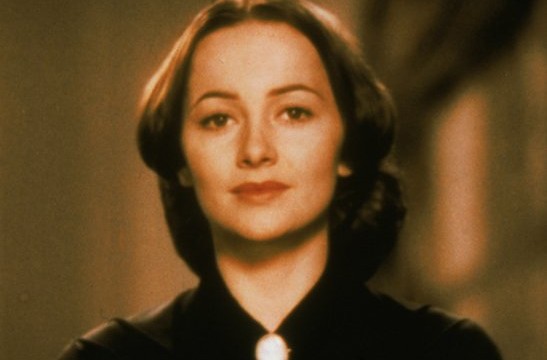I must confess that I was genuinely shocked when Joan Fontaine died. That’s surprising to say of a 96-year-old woman, especially when I add that I was not shocked to discover she was still alive. I’d known for some time that she was alive. What shocked me was this. I had long assumed that she was the next best thing to immortal, since doubtless her feud with her sister was such so that neither was willing to die until the other one did first. Either they’d die simultaneously or they’d live forever.
But Joan Fontaine is dead, and her older sister, Olivia de Havilland, is still alive at ninety-nine. Her last onscreen performance was a TV movie in 1988, and she narrated a documentary in 2009, but she’s still alive. The only other credited cast member of Gone With the Wind still alive at this point, seventy-five years later, is Mickey Kuhn—who played her son.
The thing that fascinates me about Olivia de Havilland’s career is how often she played women considered plain. Oh, I don’t think she was a ravishing beauty—though apparently, when she was nine, she left her beauty to Joan in her will, on the grounds that Joan had none. (Sibling rivalry can start young.) But she seemed to bounce between playing beauties and spinster types. It’s always struck me as odd.
I have a hard time thinking of her as anything but Melanie Wilkes, I’ll admit, though I’ve seen at least a half-dozen other movies that she did beyond Gone With the Wind. But it’s the one I’ve seen most, and it’s one I like quite a lot. I think she’s a joy in it, too, one of the only genuinely good characters. There are hidden depths to her, a well of strength that no one notices because everyone is so busy noticing that she’s propping up that waste of space Ashley. And letting Scarlett walk all over her. But when they need someone to get things done for people, they turn to Melanie.
Olivia de Havilland, from what I can see, was better at standing up for herself. Yes, she cried when Hattie McDaniel beat her to the Oscar, but I’ve long suspected that at least part of it was that it meant Joan had a chance at beating her to the award. I don’t think she would have begrudged it to her costar even if you’d asked her at the time. On the other hand, it was she who was willing to stand up to the studios, and that took some doing.
A brief explanation of the studio system, here—long ago, actors were contracted to the studios. Instead of making money per picture, they made what the contract said they’d get no matter what movies they made or how well that movie did. And they didn’t get to pick and choose their roles, either; for the most part, the studio decided who they wanted in what and what roles they’d allow people to have. Joan Crawford spoke feelingly about going on suspension rather than being in some of the turkeys the studio (at the time, MGM; she moved to Warner Bros around that point) wanted her to make.
The problem came from the studios’ policy of considering contracts to involve just the time the person was working, not calendar time. Didn’t work weekends? That didn’t count toward your contract. Put under suspension by the studio itself? That didn’t count toward your contract, either. She sued. She won. The law held that any sensible person would assume that a contract was for calendar years, and so it is; apparently, Jared and Shannon Leto filed suit under something similar to get out of a music contract and got a lovely personal note from de Havilland on the subject.
I don’t expect to ever see Olivia de Havilland work again, but there’s something pleasant to the thought that she’s alive and well and living in Paris. And, by all accounts, she’s even in decent health, presumably for her age, and of sound mind.

